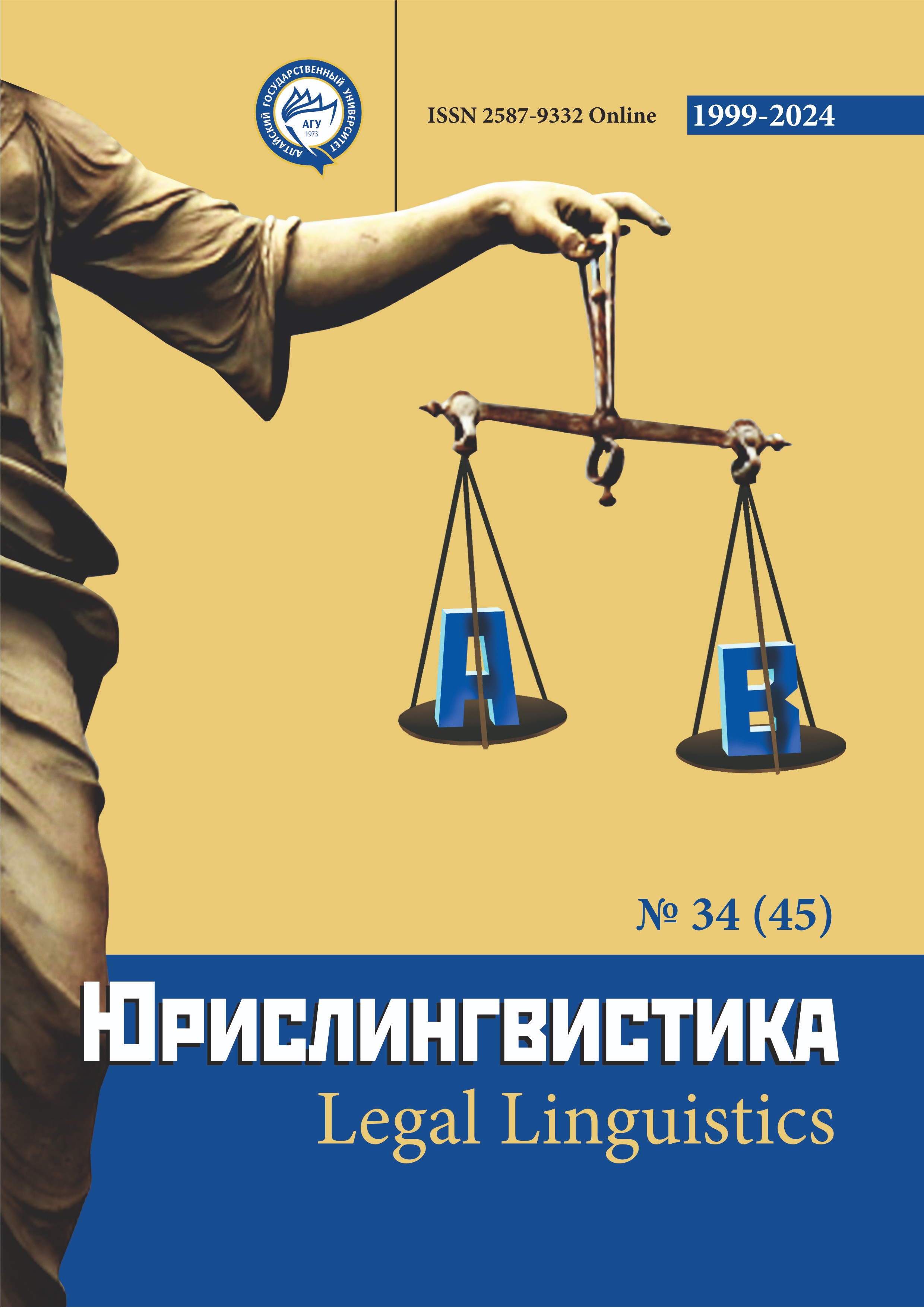Separation of Spontaneous and Non-Spontaneous Speech in Forensic Examination: Information Content of Features and Evidential Significance
УДК 343.54, ББК 67.408
Abstract
The article discusses the problems associated with the establishment of such characteristics of speech as spontaneity – non-spontaneity and preparedness – unpreparedness. Attention is drawn to the elaboration of the problem in the academic domains of linguistics and psychology and very low extent of development in the domain of forensic examination. While characteristics of spontaneity and preparedness of speech are well-described, there is no scientifically based data on their informativeness and diagnostic significance. Moreover, there are no criteria for establishing the degree of preparedness of speech and rules for making an expert decision. This leads to inconsistency of conclusions. In addition, forensic research of oral and written speech in relation to its preparedness is associated with the requirement to ensure the comparability of the object and the comparative sample in order to obtain reliable knowledge about the author of the text (utterance) and the suitability of objects and samples for identification and diagnosis.
The problem of speech preparedness also includes doubts about the forensic and legal significance of establishing such characteristics of speech as spontaneity and preparedness when conducting a forensic linguistic or psychological-linguistic examination, since the preparedness of speech is irrelevant to the unreliability of the information reported and, on the contrary, spontaneous speech does not indicate the independence and reliability of testimony.
Downloads
Metrics
References
Бердникова Т. В. Исследование спонтанности и подготовленности звучащей речи в судебной экспертизе: к постановке проблемы / Теория и практика судебной экспертизы. – 2023. – Т. 18. – № 4. – С. 6–11.
Галяшина Е. И. Основы судебного речеведения: Монография / Под ред. проф. М. В. Горбаневского. М., 2003.
Гивец П. В., Грибер А., Кокин А. В. О критериях оценки заключения эксперта и экспертных методик участниками судопроизводства / Теория и практика судебной экспертизы. – 2022. – Т. 17. – № 1. – С. 27-37.
Гончарова М. О. Установление лингвистических признаков заученности или чтения в речи допрашиваемых лиц / Судебные лингвистическая, психологическая, политологическая экспертизы: вызовы времени и стратегия развития: материалы Всероссийской конференции «Восток–Запад: партнерство в судебной экспертизе» (г. Казань, 2–6 октября 2023 года) / Сост. Т. Н. Секераж, В. О. Кузнецов. М., 2024. С. 42-46.
Долинин К. А. Стилистика французского языка. М., 1987.
Исаева А. А. Маркеры дифференциации спонтанной и подготовленной речи / Вестник ВГУ. Серия: Лингвистика и межкультурная коммуникация. – 2020. – № 4. – С. 37–48.
Хитина М. В. Дифференциация спонтанной (неподготовленной) и подготовленной устной речи. Методическое письмо для экспертов. М., 2003.
Секераж Т. Н. Судебная психологическая экспертиза информационных материалов: теория и практика: монография. М., 2021.
Цинкерман М. В., Поликарпова О. С. Критерии выявления психологических признаков заученности/подготовленности показаний / Комплексная психолого-психофизиологическая судебная экспертиза: современное состояние и перспективы развития: Сборник статей Международной научно-практической конференции. Калужский государственный университет им. К. Э. Циолковского. 2016. С. 246-255.
Boccaccin M. T., Gordon T., Brodsky S. L. Witness preparation with real and simulated criminal defendants / Behavioral Sciences and the Law. – 2005. – No. 23 – Pp. 659-687.
Kenny O. P., Nelson D. J., Bodenschatz J. S. and McMonagle H.A. Separation of non-spontaneous and spontaneous speech / Proceedings of the 1998 IEEE, Seattle, WA, USA – 1998. – Pp. 573-576. – Vol.1.
Oeberst, A., & Oberlader, V. Degrees of freedom as a breeding ground for biases – A threat to forensic practice. Law and Human Behavior. 2024.
Posey A. J., Wrightsman L. S. Trial consulting. New York, 2005.
Salmi L. R. Don’t walk the line: Ethical consideration in preparing witnesses for deposition and trial / Review of Litigation. – 1999. – No. 18. – Pp. 135-179.
Tess M. S. Neal. Expert Witness Preparation: What Does the Literature Tell Us? American Society of Trial Consultants. – 2009. – Vol. 21. No 2.
Copyright (c) 2024 Татьяна Секераж

This work is licensed under a Creative Commons Attribution 4.0 International License.
The authors, which are published in this journal, agree to the following conditions:
1. Authors retain the copyright to the work and transfer to the journal the right of the first publication along with the work, at the same time licensing it under the terms of the Creative Commons Attribution License, which allows others to distribute this work with the obligatory indication of the authorship of this work and a link to the original publication in this journal .
2. The authors retain the right to enter into separate, additional contractual agreements for the non-exclusive distribution of the version of the work published by this journal (for example, to place it in the university depository or to publish it in a book), with reference to the original publication in this journal.
3. Authors are allowed to post their work on the Internet (for example, in a university repository or on their personal website) before and during the review process of this journal, as this may lead to a productive discussion, as well as more links to this published work (See The Effect of Open Access).











